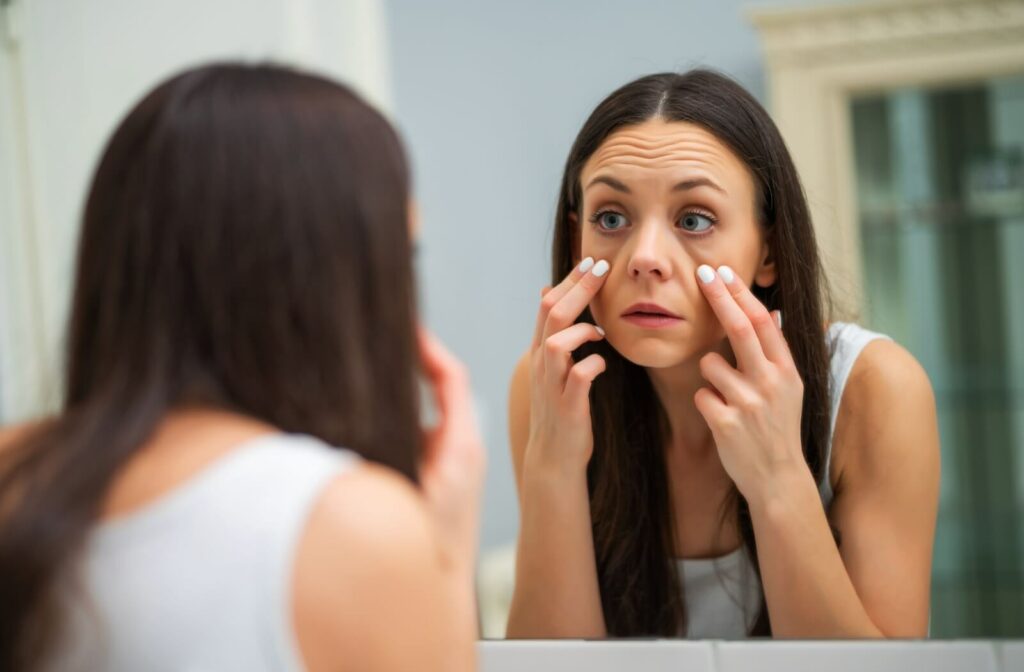Dry eyes happen when your body doesn’t produce enough tears or moisture for your eyes. The sensation can feel very unpleasant and in some occasions it can affect a person’s vision. Americans are being diagnosed with dry eye disease in record numbers today and everyday tasks at work and school can be harder if you suffer from this condition.
Factors such as prolonged contact lens wear or dry environments might cause temporary dry eye symptoms. However, if your symptoms improve or worsen, but they won’t go away fully, it’s best to book an appointment with your eye doctor to see what’s going on.
Common reasons you might be waking up with dry eyes include:
- Side effects to prescribed or over the counter medicines.
- Health conditions such as diabetes, thyroid problems, and autoimmune disorders.
- If you’ve recently undergone eye surgery, you may experience dry eyes in the morning, consult with your doctor if this is still happening.
- The environment you live in can also affect your eyes while you sleep, causing dry eyes in the morning. Windy, smokey or extremely dry environments can affect your eyes.
- Spending several hours in front of a computer can be a contributor to dry eyes. Taking longer breaks or wearing glasses can help you here.
Insufficient Tear Production
For eye doctors, one of the most frequent issues they deal with is tear film quality. It affects women more often than it does males. Tear quality issues happen when there’s a problem with the parts of your eyes that produce tears. These parts include the tear glands and the nerves that control them. A common issue that causes tear problems in adults over 40 is Meibomian gland disease (MGD).
Tear Quality Matters
Dry eyes can be caused by lack of tears but also by not having good quality tears. The three layers of tears serve to hydrate and shield the cornea. Layers of water, mucous, and oil are among them. The water layer keeps the eye hydrated, and the oil layer keeps the water layer from drying out.
Tears are evenly distributed along the surface of the eyes. To create tears, each of these three layers must be present. If any of these layers aren’t sufficiently thick, the quality of the tears decreases.
Allergies & Dry Eyes
Waking up feeling clogged or with extreme discomfort is no joke. Allergies can make you feel as if you have a cold, making your eyes feel itchy and dry. Common allergens out there include pet dander, skin care products and dust. Over time, dry eye condition may worsen allergies, and regular allergies can also damage the surface of the eye.
If you tried regular over-the-counter remedies without success, a visit to the eye doctor may help you feel at ease.

Contact Lenses
Dry eyes affect millions of people, but you might be at higher risk if you wear contact lenses.
Contact lenses are an effective way to correct your vision, but there are risks associated with wearing them overnight.
To avoid an infection or waking up with dry eyes, it’s recommended to avoid sleeping in your contacts at night. If you are wearing them overnight and you’re experiencing dry eyes in the morning, pick up the phone and talk to your doctor about changing your routine.
Stopping Dry Eyes When You Wake Up
So now that you know some of the main causes of dry eyes in the morning, how can you stop it? First, you may try different remedies at home.
Your symptoms of dry eyes can be relieved and your comfort level raised with a warm compress. This solution helps the glands that produce the oil layer of the tears work better by liquefying the oils that are stagnant.
Additionally, gentle cleaning of your eyelashes with a warm, damp cloth can help remove debris and oil buildup. Avoiding contact lenses, especially during sleep, can also reduce irritation and dryness.
However, if you’re still experiencing discomfort, book an appointment with your eye doctor and get a comprehensive eye exam.
When you see your doctor, don’t forget to mention any medications that you may be taking, this can help them determine the best course of action. Following your visit to the doctor, they might recommend some lifestyle changes or prescribe other treatments.
Key Takeaways
For discomfort associated with dry eyes, you might try different at-home treatments. This can involve cleaning your eyelashes, avoiding wearing lenses, and using a warm compress. In case your discomfort persists for a prolonged period, it is important to schedule a consultation with your eye doctor. In addition to performing a thorough eye examination, they can suggest a course of treatment based on the particular root cause of your symptoms.For expert advice and personalized care, contact Verona Vision Care today to schedule your consultation.




